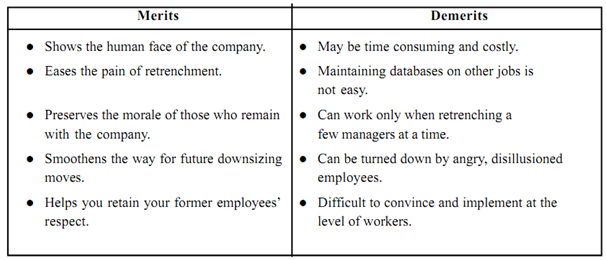Retrenchment
Retrenchment means the permanent termination of an employee's services due to economic reasons (like surplus staff, general economic slowdown, poor demand for products, etc.) It should be noted down here that termination of services on disciplinary grounds, retirement, illness, and winding up of a business does not constitute retrenchment. In respect of organisations employ 100 or more people, the Industrial Disputes Act, 1947, makes it compulsory for the employer to give advance notice or pay equivalent wages before the real lay off date. To claim 50 % of basic wages plus dearness allowances, the workman (whose name shows on pay roll, who is not a casual worker, who has finished 12 months of constant service) must present himself on each working day at the agreed time inside the factory/office premises during the period of lay off. If compulsory, he might be asked to report a second time during the similar day. When laying off workman, the employer is expected to follow the first-in-last-out principle. He should give preference to such kind of workmen if he advertises for reemployment against future openings. The employer must give three months' notice before retrenching the employee and get prior approval from the government as well.
Box
- Stop hiring people while the first signals of trouble ahead surface. It would send the right message to the trade unions.
- Better to be on good terms with all of the trade unions.
- Directly allay the workers' suspicions by communicating with them.
- Design a severance package having incentives for redeployment and training.
- Never utilize pressure tactics to intimidate your workers into leaving.
An example:- JK Synthetics closed down its polyester staple fibre plant in the year1981. A 14-year long legal battle followed. The closure was declared illegal in the year of 1995. Now 1100 workers might have to be reinstated along with their salaries for 14 years! Therefore companies have started the voluntary retirement schemes. NTC has shed 45,000 workers, British Oxygen, ACC, Premier Automobiles-9,000, 3,700 & 3,500 employees respectively - after getting from unions. HMT, Caltex have gone a step ahead and offered the chance to employees who opt for VRS to begin retail and ancillary activities on behalf of these companies! Caltex sold petrol pumps to employees accepting VRS: others like, Sandoz, Philips, TISCO are trying to come out with more attractive VRS packages.
|
Outplacement: Workers who are retrenched/laid off might have difficulty in searching an alternative job if the market conditions are adverse. There may be a demand for definite category of workers possessing multiple skills, but the retrenched workers may not have those 'marketable skills'. To fill this vacuum, some of organisations offer training in such kinds of skills and assist the retrenched employees in searching a suitable job elsewhere. Outplacement assistance includes 'efforts made by employer to help a recently separated worker find a job' (Davis, p.269). Apart from training, some of multinational firms offer assistance in the form of paid leave, search firm charges, travel charges for attending interviews, waiving bond requirements to the retrenched employees. Bank of America has given a 'fat sum' as liberal retrenchment compensation running into numerous lakhs of rupees to all of the eligible retrenched officers in the year 1998. It has also held counselling sessions for those officers on issues like how to repay their car/house loans, where for invest their money, etc. Search firms were also hired to discover suitable employment. While the downsizing attempt stabilised, Bank of America had even extended the former employees' a 'warm welcome back home!' Such type of outplacement assistance, in whatever form it is available, assures the remaining workers of the management's commitment towards their welfare if a further downsizing ever happens to occur in future.
Box: Merits and Demerits of Outplacement

Suspension: Suspension means prohibiting a worker from attending work and carrying out normal duties assigned to him. It is a sort of punishment for a particular period and generally is resorted to just after a proper inquiry has been conducted. During suspension, the worker receives a subsistence allowance. If the charges against the suspended worker are serious and are proved, suspension might lead to termination also